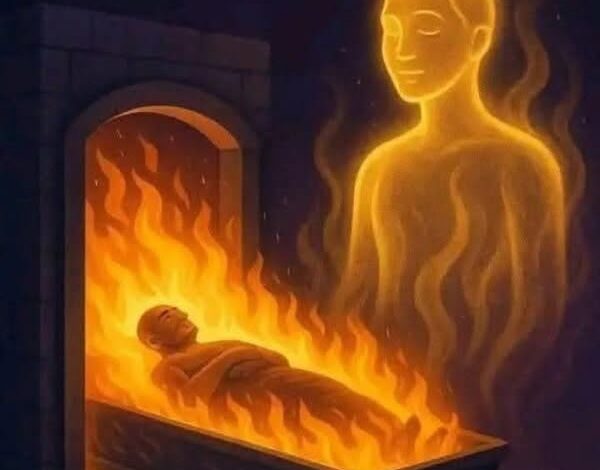
THE SIN OF CREMATION according to the Bible says
Cremation has become an increasingly common choice for families in recent decades, especially in the Western world, where tradition and culture have shifted toward practicality, affordability, and even environmental concerns. Yet for many Christians, a lingering question remains: Is cremation a sin according to the Bible?
The Bible does not directly forbid cremation. There is no explicit commandment against burning a body after death. Still, many theologians, pastors, and believers have debated the subject for centuries, pointing to scriptural principles, cultural traditions, and symbolic meanings that go far beyond what happens to a body after death.
Burial in Biblical Tradition
From Genesis to the Gospels, burial is the method most often described in scripture. When Abraham’s wife Sarah died, he purchased a field and a cave to lay her body to rest (Genesis 23). Generations later, Jacob insisted on being buried with his ancestors, and Joseph, though embalmed in Egypt, gave instructions that his bones should be carried back to the Promised Land.
The greatest example comes with the burial of Jesus himself. After his crucifixion, his body was placed in a tomb, wrapped in linen, and prepared with spices, following the customs of the time. For Christians, this act of burial is not just cultural—it is deeply tied to the hope of resurrection.
Genesis 3:19 reminds humanity: “For dust you are, and to dust you shall return.” For centuries, burial has been seen as a symbol of this truth. It reflects the cycle of life, death, and the promise of new life through resurrection.
The Body as the Temple
One of the strongest arguments against cremation comes from passages like 1 Corinthians 6:19, which describes the human body as the “temple of the Holy Spirit.” To many Christians, the body deserves respect even after death. Burial, in this view, honors the vessel that carried the soul and visibly expresses faith in the resurrection described in 1 Thessalonians 4:16: “For the Lord himself will descend from heaven with a cry of command… and the dead in Christ will rise first.”
From this perspective, cremation is troubling because it appears to destroy the body rather than preserve it in anticipation of resurrection. To some, fire suggests judgment rather than peace, making burial the more “faithful” choice.
God’s Power Beyond the Grave
On the other hand, many Christians argue that God’s power is not bound by the method of death or decomposition. Countless martyrs throughout history perished in flames, drowned at sea, or were devoured by wild beasts. Others died in natural disasters where their bodies were never recovered. Surely, the God who created life itself can resurrect a body regardless of what remains are left behind.
This view emphasizes God’s sovereignty and omnipotence. Whether a body returns to dust naturally in a grave or is reduced to ashes by fire, it is no obstacle for the Creator who “knit us together in the womb” (Psalm 139:13).
The Question of Motives
For pastors and theologians who guide believers on this issue, the question is often not about how a body is laid to rest but why.
“If someone chooses cremation for selfish or pagan reasons, that’s where the spiritual danger lies,” said Pastor John Elliott of Faith Assembly Church. “It’s less about the method and more about the heart.”
In ancient times, cremation was sometimes associated with pagan rituals, sacrifices, or beliefs that denied resurrection. Choosing cremation for those reasons might conflict with Christian faith. But for a believer who chooses it for financial reasons, simplicity, or personal conviction, the choice does not necessarily carry sin.
Practical Considerations in the Modern World
Cremation often appeals to families because of cost. A traditional burial can be prohibitively expensive, involving a casket, burial plot, and service fees. Cremation is often cheaper, more flexible, and sometimes considered more environmentally friendly.
In cultures where space for cemeteries is scarce, cremation has become almost a necessity. In Japan, for example, over 95% of people are cremated due to limited land. Even in Western countries, the percentage of cremations has risen sharply over the last fifty years.
This raises another question: should financial or cultural pressures determine what believers do with the body? Or should Christian families prioritize the symbolism of burial, even at a higher cost? These are questions many families wrestle with in private.
Personal Conviction and Community Traditions
Ultimately, the Bible’s silence on cremation means the matter falls into the realm of personal conviction. Romans 14:23 reminds believers: “Whatever does not proceed from faith is sin.” If a Christian feels that cremation violates their faith, then they should avoid it. If another feels peace in choosing it, trusting God’s power to resurrect, then they can proceed without guilt.
Church traditions also play a role. Some denominations discourage or even prohibit cremation. The Roman Catholic Church, for example, now permits cremation but still emphasizes that the ashes must be treated with the same dignity as a body—buried, entombed, or placed in a sacred location rather than scattered or divided.
Protestant traditions vary widely, with some pastors strongly favoring burial and others leaving the choice entirely to the individual.
The Eternal Question
So, is cremation a sin? The answer is not black and white. The Bible leans toward burial as a tradition, symbol, and act of faith, but it does not explicitly condemn cremation. For many believers, the real issue is not the method of handling the body but the heart and conviction behind the choice.
Burial carries centuries of symbolism: respect for the body, a reflection of biblical examples, and the hope of resurrection. Cremation, while less traditional, does not limit God’s ability to raise the dead or to fulfill His promises.
In the end, death is not the final word. Whether buried in the earth or cremated into ashes, the hope of Christianity remains the same: that life continues beyond the grave, and that in Christ, believers will be raised to new life.
As culture evolves and families face practical challenges, the discussion around cremation will likely continue. But for Christians, the most important focus is not how the body returns to dust—it’s the assurance of what comes after.
The eternal question is not about burial or cremation. It is about resurrection, redemption, and what awaits us beyond this life.




